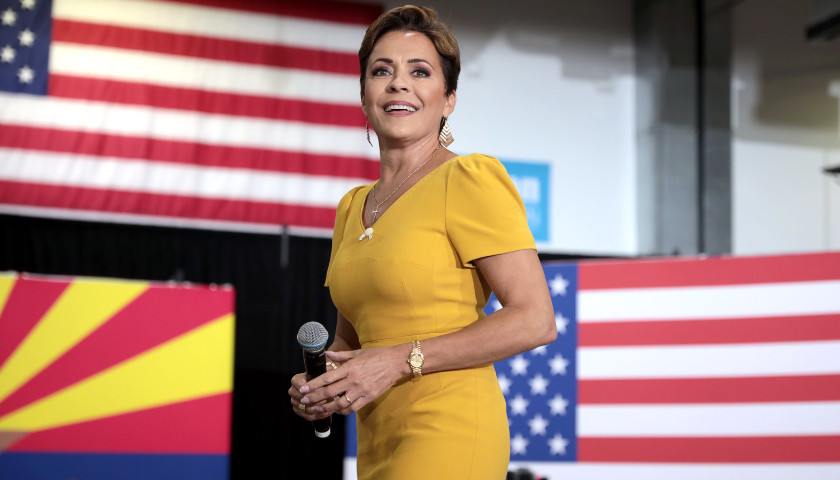Ruben Gallego has been able to outraise Kari Lake by about three to one, but some are questioning the sources. In addition to large amounts of money from out-of-state donors, a significant amount of his contributions come from “Smurfing,” donations from elderly unemployed Democrats who are unaware their names are being used to donate to Democratic candidates.
According to Arizona Capitol Media, Lake has raised over $19 million throughout the race, while Gallego has raised almost $54 million. Gallego currently has $7.2 million on hand, while Lake has $4.5 million in the bank.
According to an analysis in May by 12 News, only about one-quarter of the money Gallego raised, 26 percent, came from within the state. In contrast, Lake, who has a much more prominent national profile than Gallego, raised 32 percent from Arizonans.
Tyler Bowyer of Turning Point USA posted on X, “Leading into this election — his top contributions are all significantly outside of AZ. In fact, millions have been funneled to his campaign through Massachusetts — and ActBlue. He would be a third Senator for Massachusetts!”
He included screenshots showing that Massachusetts donors gave Gallego more than twice as much money as Arizonans did in March. They contributed $8,016,902, whereas Arizonans only contributed $2,784,213. The $8 million from Massachusetts donors came through the Democratic fundraising platform ActBlue, with Gallego receiving $17 million through ActBlue in total.
Campaign finance researchers are accusing ActBlue of money laundering donations for Democrats through the names of elderly unsuspecting Democrats, known as Smurfing. When investigative journalist James O’Keefe visited the modest homes of these elderly folks, who had reportedly donated large amounts of money to Democrats in thousands of separate donations, they denied knowing anything about it.
A search of FEC records reveals that during the 2023-2024 campaign cycle, 156,503 donations were made to Gallego’s campaign. Of those, 20,352 were for $9 or less, with most of the donors’ employment status listed as unemployed.
Carolyn Wren, a senior advisor to Lake, posted on X that a man from New York contributed to Gallego over 200 times. Between 2018 and 2024, Richard Goldstein made 46,820 contributions to ActBlue and Democratic candidates for a total of $806,770, even though his employment status was listed as none.
Similarly, Wren discovered that Charlotte Kinsella, also listed as unemployed, contributed to Gallego 70 times. Between 2018 and 2024, she made 25,041 contributions to ActBlue and Democrats for a total of $623,155.
Finally, Wren found that unemployed Virginia Smith donated to Gallego 57 times. She made 18,684 contributions to ActBlue and Democrats for a total of $300,812. Wren pointed out, “Her home was valued at $269,800 – meaning she has donated more to Democrats via ActBlue than her home is worth….”
The Gateway Pundit contacted the widower of a donor who had allegedly contributed 75 times totaling $1,582 to Gallego’s previous congressional campaign before she died. FEC records also show the woman, Angela Cito, made 5,058 contributions totaling $66,981 to Democratic candidates. Her husband told the news site “there’s no way” she made all those contributions.
Representative Claudia Tenney (R-NY-24) wrote a letter to the FEC in August about the problem. She pointed out the lack of requiring CVV codes. She said, “Given the deliberate lack of security in their donation practices, it is unsurprising that ActBlue could be exploited for fraudulent activities.”
After looking into the Smurfing, House Administration Committee Chairman Bryan Steil (R-WI-01) made referrals to five state attorneys general last month. “This investigation focused on potential unlawful exploitation of unwitting ‘straw donors,’ whose identities may have been used to channel illicit funds into campaigns in your state,” he said to the top law enforcement officials in Arkansas, Texas, Missouri, Virginia, and Florida.
Virginia Attorney General Jason Miyares sent a letter to ActBlue in August commencing an investigation. Texas Attorney General Ken Paxton’s investigation prompted the fundraising organization to state that it would start requiring CVV codes with donations.
On October 1, 19 Republican attorneys general sent a letter to ActBlue demanding information by October 23 on how the fundraising entity confirms that donations are not being made in the names of straw donors.
Billionaire donors can give up to $123,900 to independent expenditure committees supporting Gallego to circumvent the individual limit of $3,300 for contributing directly to the campaign. Arizona’s 12 News listed some prominent Democratic billionaires who contributed, including $21,600 from Illinois’ billionaire Governor Jay Pritzker.
OpenSecrets lists the top donors to Gallego’s campaign this cycle: the organizations’ PACs, employees, or others affiliated with the organizations. The University of Arizona is the top contributor with $71,466, followed by Arizona State University with $67,868. Google is third at $62,190. The left-leaning Wilmer Hale law firm is fourth with $40,460. Trial lawyers are usually around the top donors to Democrats. The State of California contributed $57,030 and the U.S. government $38,547.
The left-wing group Protect Progress has spent $3.5 million on commercials for Gallego, the most on any candidate. Other left-wing groups spending almost a million dollars each or more on the race include the Democratic Senatorial Campaign Committee, the WinSenate PAC, the LCV Victory fund, which is the PAC run by the League of Conservation Voters, and VoteVets.
The far-left Congressional Hispanic Caucus’s PAC is starting to spend over $1 million in ads. However, the Frontiers of Freedom SuperPAC is hitting back with its ads calling out Gallego’s “record of anti-Catholic bigotry.”
A donation page on ActBlue from Democratic Underground for Gallego admitted there would be many small donations. It stated, “Here is the truth: Ruben’s campaign is going to be funded primarily by lots of people making small donations. That’s how it’s been these first days, and how it will be for the whole campaign.”
In 2015, Gallego was fined by the FEC for failing to disclose nearly $53,317, “a staggering majority of the Gallego campaign’s expenditures for the filing period.” The campaign finance watchdog CREW said only one local news outlet covered the scandal.
Democrats are outraising Republicans overall in Senate races across the country. AdImpact states that over $603 million will be spent on the 34 Senate races in 2024, with almost $348 million favoring Democrats.
Gallego outspent Lake three-to-one, $25,027,480 as of July 10, to Lake’s $8,304,367 reported on September 30. Unlike Gallego, Lake had a primary challenger in her race, which consumed some resources.
In Gallego’s safe congressional district, the amount he raised was minimal compared to this race. He raised only $97,580 for his first winning race in 2010, which mostly increased each cycle ending with $1,817,954 in the 2020 cycle.
According to OpenSecrets, in the 2022 Senate election cycle, the candidate who spent the most won 82 percent of the time.
Gallego sent a text message to his supporters a few days ago stating that Lake had more cash on hand than he did.
– – –
Rachel Alexander is a reporter at The Arizona Sun Times and The Star News Network. Follow Rachel on Twitter / X. Email tips to [email protected].





